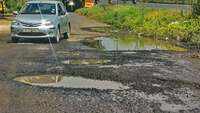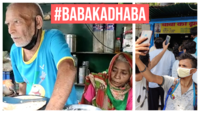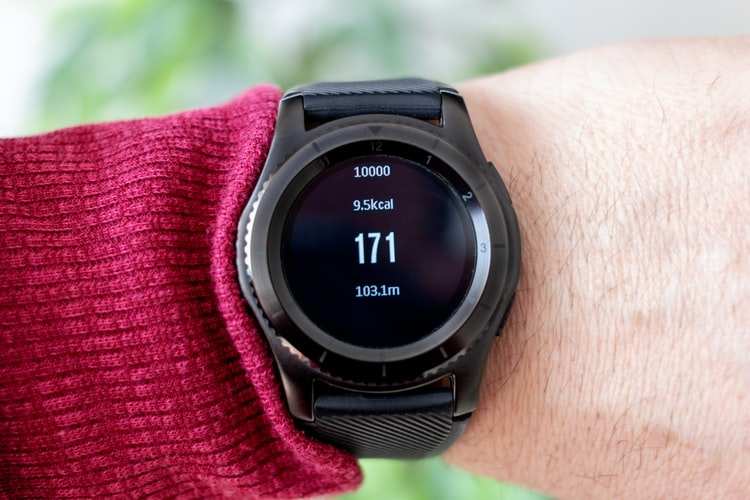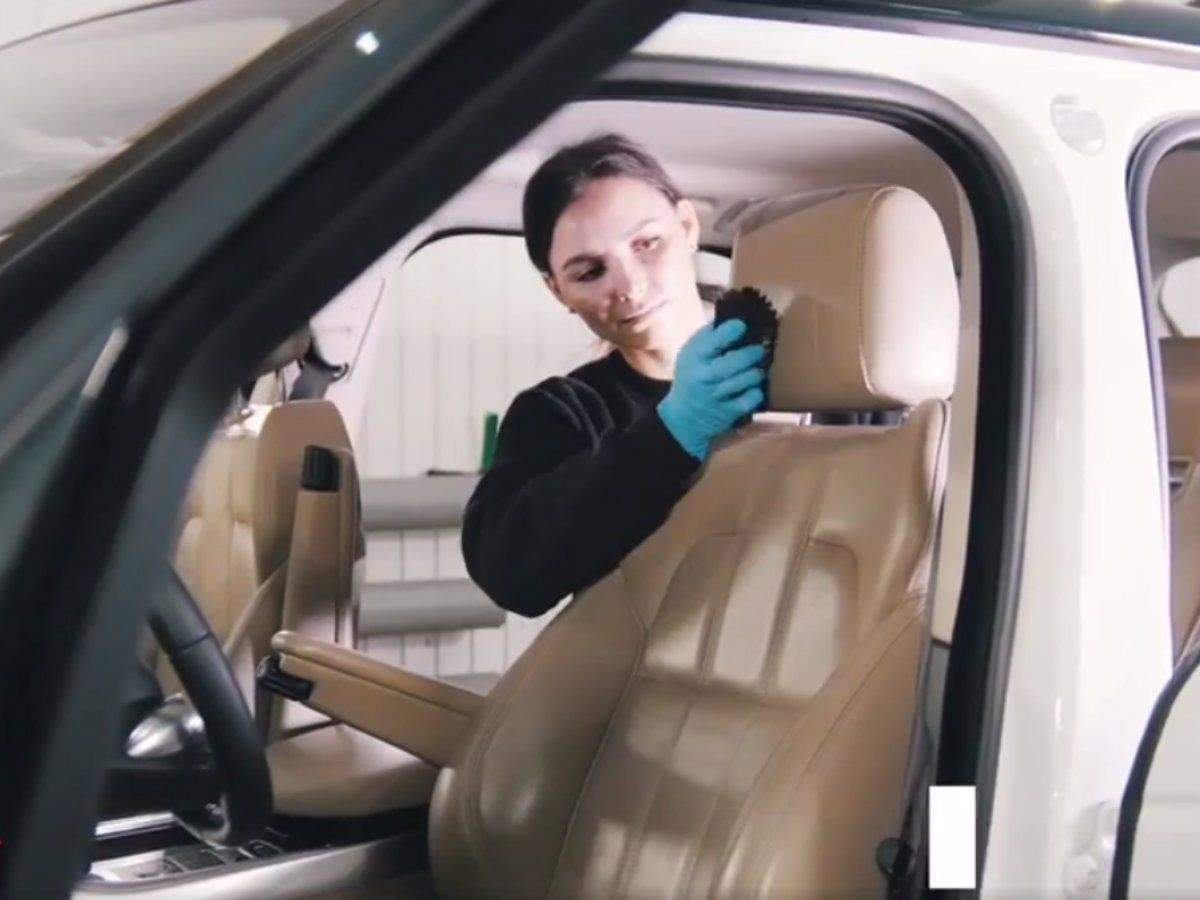
PUNE: Paediatric surgeon Dasmit Singh calls his survival a miracle; the result of his doctors' efforts. "A patient in the United States had what I had. He was a super-healthy 19-year-old. He died."
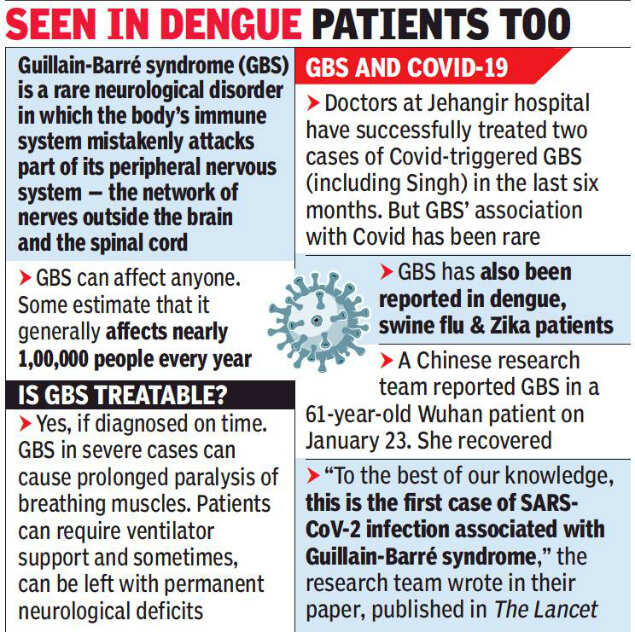
Singh, attached to Jehangir Hospital, was on duty early September when he started to experience sore throat and fatigue. Within just two days, he started to show serious neurological complications.
"My legs started to lose power. I had to pick my legs with my hands and place them in the car. My wife drove me to the hospital after I tested positive for Covid-19," Singh said.
But the virus pulled an extremely rare move in the 58-year-old doctor. Instead of attacking his respiratory systems, it went straight for his peripheral nervous systems - mainly the nerves that branch out from the spinal cord.
It took a battery of tests for Singh's physicians to arrive at the real problem: the coronavirus had triggered what's known as the Guillain-Barré syndrome (GBS) or demyelinating radiculoneuropathy - a rarely reported neurological strike by Covid-19. Singh had become a one-in-a-million case.
The syndrome has been observed in swine flu patients as well. It's also completely treatable, but if not dealt with in time, severe GBS can cause prolonged paralysis of the breathing muscles.
Jehangir Hospital's infectious diseases specialist Piyush Chaudhary did not waste any time when Singh was brought in on September 18. Chaudhary immediately roped in neurologist Sandeep Borse.
"All the tests were done quickly as GBS is known to worsen rapidly within hours. It can cause paralysis of limbs and muscles in the neck, face and even respiratory muscles. Patients will require ventilator support," Borse said.
Singh was started with intravenous immunoglobulin injections for five days, which prevents or blocks antibodies triggered by Sars-CoV-2 virus that can damage nerves.
On the second day of injections, Singh's leg paralysis started to ease. By the fourth day, he was standing and by the 10th day, he had regained strength in the limbs.
"I don't fear anything, not even death. And being a Sikh helps in that," said Singh. "I had already started planning for a life in a wheelchair. I even thought up a transfer system to get out of bed and into the chair. But these doctors left no stone unturned. They gave me timely and the best treatment possible."
The doctor is set to resume work soon.

Singh, attached to Jehangir Hospital, was on duty early September when he started to experience sore throat and fatigue. Within just two days, he started to show serious neurological complications.
"My legs started to lose power. I had to pick my legs with my hands and place them in the car. My wife drove me to the hospital after I tested positive for Covid-19," Singh said.
But the virus pulled an extremely rare move in the 58-year-old doctor. Instead of attacking his respiratory systems, it went straight for his peripheral nervous systems - mainly the nerves that branch out from the spinal cord.
It took a battery of tests for Singh's physicians to arrive at the real problem: the coronavirus had triggered what's known as the Guillain-Barré syndrome (GBS) or demyelinating radiculoneuropathy - a rarely reported neurological strike by Covid-19. Singh had become a one-in-a-million case.
The syndrome has been observed in swine flu patients as well. It's also completely treatable, but if not dealt with in time, severe GBS can cause prolonged paralysis of the breathing muscles.
Jehangir Hospital's infectious diseases specialist Piyush Chaudhary did not waste any time when Singh was brought in on September 18. Chaudhary immediately roped in neurologist Sandeep Borse.
"All the tests were done quickly as GBS is known to worsen rapidly within hours. It can cause paralysis of limbs and muscles in the neck, face and even respiratory muscles. Patients will require ventilator support," Borse said.
Singh was started with intravenous immunoglobulin injections for five days, which prevents or blocks antibodies triggered by Sars-CoV-2 virus that can damage nerves.
On the second day of injections, Singh's leg paralysis started to ease. By the fourth day, he was standing and by the 10th day, he had regained strength in the limbs.
"I don't fear anything, not even death. And being a Sikh helps in that," said Singh. "I had already started planning for a life in a wheelchair. I even thought up a transfer system to get out of bed and into the chair. But these doctors left no stone unturned. They gave me timely and the best treatment possible."
The doctor is set to resume work soon.

Coronavirus outbreak
Trending Topics
LATEST VIDEOS
More from TOI
Navbharat Times
Featured Today in Travel
Quick Links
Delhi Air PollutionHaryana Coronavirus Helpline NumberUP Coronavirus Helpline NumberBangalore TemperatureBhopal NewsCoronavirus in DelhiCoronavirus in HyderabadHyderabad RainCoronavirus symptomsCoronavirusDelhi TemperatureAditya ThackerayShiv SenaFire in MumbaiMumbai RainsArvind KejriwalBangalore FloodsSrinagar encounter
Get the app

